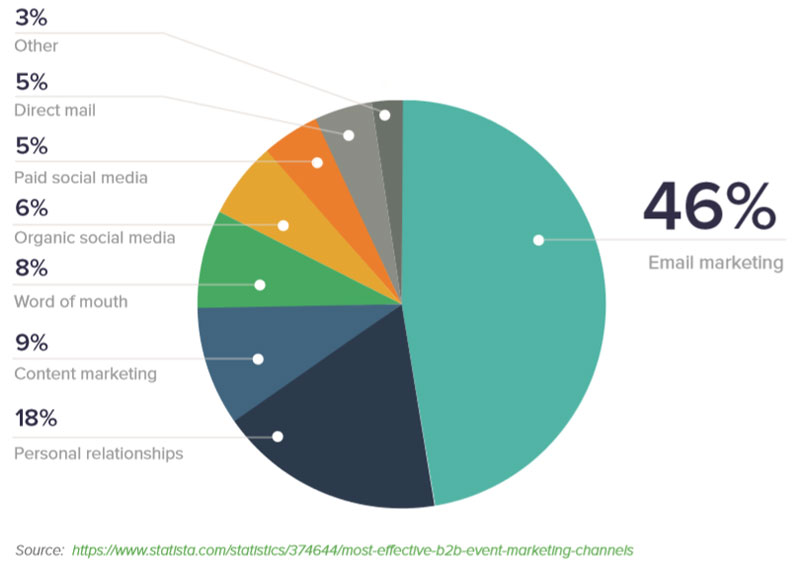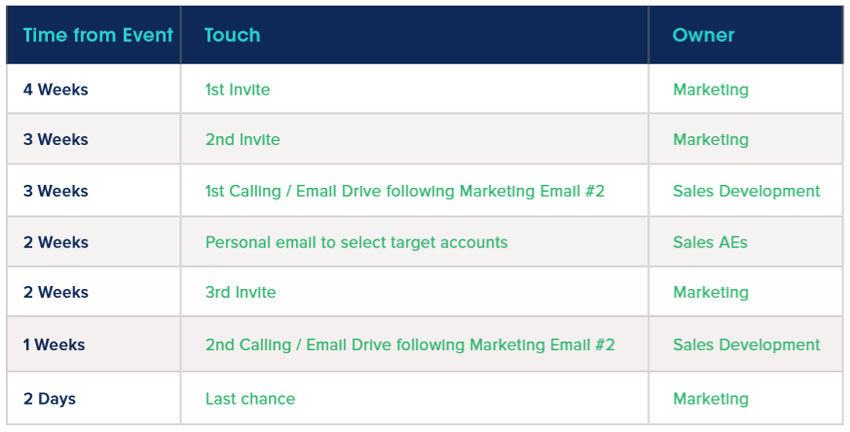A successful event starts long before the day of, with the marketing that will drive attendance, engagement and brand awareness. How far in advance that promotion needs to happen depends on the size and type of event, and the channels you’re using for marketing. In order to plan for enough lead time for promotion, determine which channels you’ll use and develop a calendar for making it all happen, working backward from the day of the event.
To determine which channels are most effective for your target accounts, so you can focus your efforts and budget, look to past methods that have worked well for you. Also keep in mind what other event marketers say. When B2B marketers were asked about the most effective channels for promoting events, 46 percent of respondents cited email marketing as the best. In second place, 18 percent cited personal relationships as the most effective channel.
As the research shows, for most events, email will be your top promotion vehicle. Your email marketing should be ongoing and strategic, and should start well in advance of the event. It should focus on the value of the event, not on trying to sell a registration.
Some tips for pre-event promotion success:
-
Align marketing and sales
Well before the event, marketing and sales teams should meet to discuss the specific target accounts within the chosen geographic area that everyone will focus on. Likewise, the team should review specific titles within those accounts that will be the ideal attendees. Prioritize titles that are most likely to be decision makers on a sale, but also consider whether you want to open the event up to affiliated titles that may help introduce you or influence the decision making within a target account.
Marketing and sales should work together to enrich the target attendee list—even if you are contending with missing contact data, chances are you know someone who knows someone who can help you reach the right person to invite. Sales, marketing and partners can work together to identify first and second-degree contacts they have within target accounts. Alternatively, a number of third-party services specialize in database enrichment, and those tools may be worth investing in as well.
-
Personalize email invites from marketing and sales
– In our experience, prospects and customers are more likely to respond to direct, personal invites than automated marketing emails. Using CRM tools and notes from previous communications will help establish relationship continuity. A solid invite strategy will combine both personalized individual invitations to specific contacts with automated emails to larger prospect lists. Once your attendees have registered, you might want to begin to release content bit-by-bit leading up to the event via confirmation and reminder emails.
Below is a pre-event email touch plan example that we recently published in “The Event Marketing Playbook.”
While email will most likely be your most successful channel, here are some other pre-event promotion channels and tips to consider:
- Blogging – Blogging leading up to the event should be ongoing with a content strategy to build interest. Blogging should continue after the event as well, as you provide summaries and highlights. This can include guest blogging if a speaker would like to contribute, or a Q&A with a speaker for the event or someone from inside your company if they will be presenting.
- Press release – Although a press release is unlikely to generate any real press, it’s still a good idea to get the word out this way.
- Social media – Create an event hashtag and start using it as soon as you can, closely follow the activity on Twitter and respond when appropriate. Plan to use other social media—including LinkedIn, Facebook and those platforms that make sense—in whatever way is appropriate for your company and your audience. The key here is to be consistent and strategic.
- Paid advertising – Depending on the event, it might make sense to do pay-per-click advertising or to purchase a display ad in an industry publication, either in print or online.
Having a strong pre-event content and promotion strategy is crucial to seeing solid results from your events. You must align your sales and marketing teams to clearly define your target accounts and create a content and promotion plan that will successfully drive those accounts to your event. Remember it is quality not quantity of leads. The more you do pre-event to engage your target accounts to drive attendance from qualified leads, the better results you will see in your sales pipeline.


